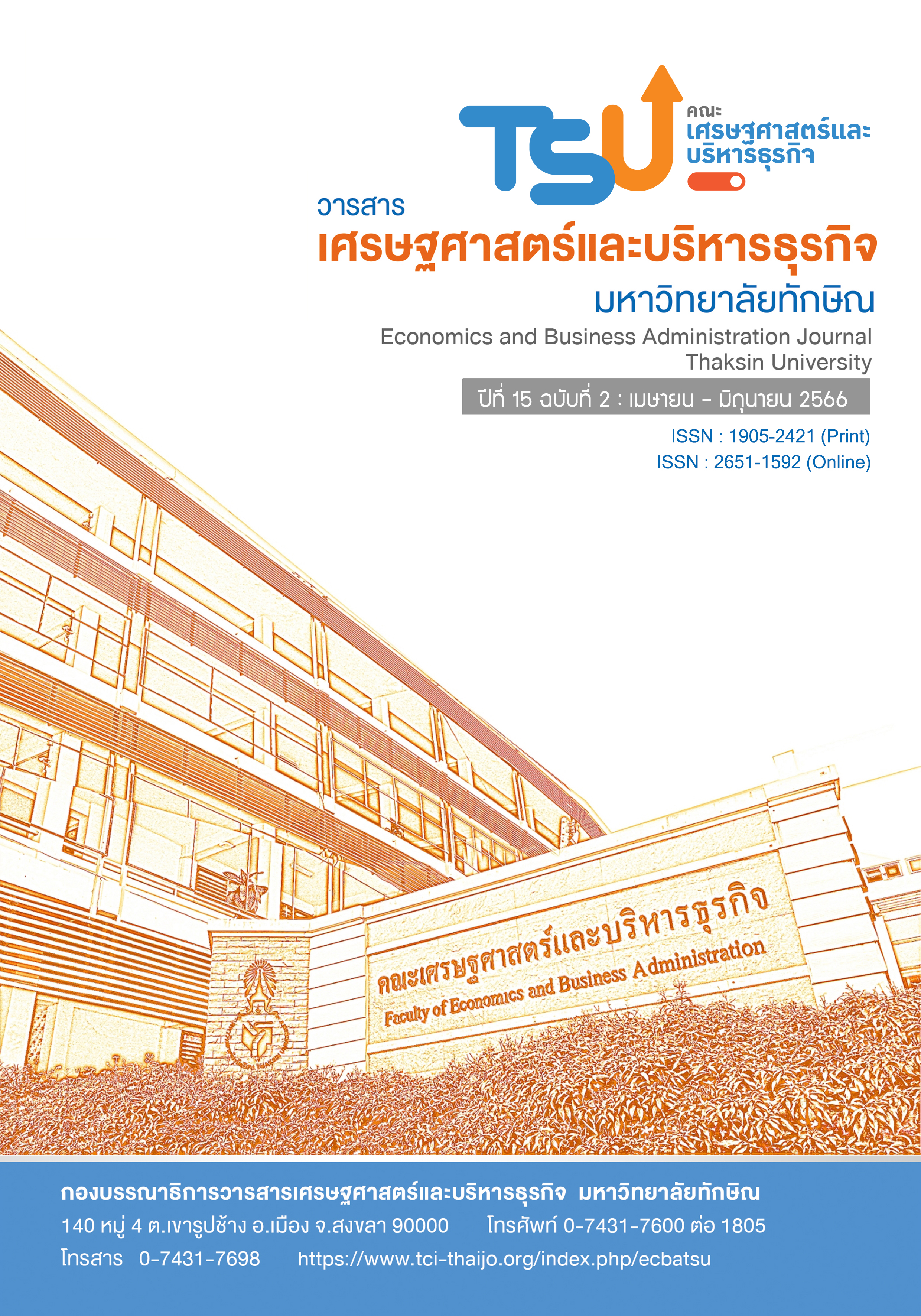Relationship between Earnings Management and Dividend Payout of Listed Companies in the Stock Exchange of Thailand
DOI:
https://doi.org/10.55164/ecbajournal.v15i2.259383Keywords:
Earnings Management, Dividend Payout, The Stock Exchange of ThailandAbstract
This research aims to study the relationship between earnings management and dividend payout of listed companies in the Stock Exchange of Thailand. The data are acquired from 925 listed companies during 2018-2020. The gross accrual earnings management variable is measured at the discretion of executives using the model of Yoon et al. (2006). The research hypotheses are tested by using the logistic regression analysis and multiple regression analysis. As a result, it is found that earnings management using the discretionary accrual level is not associated with dividend payouts of the listed companies. This may be because dividends are insufficient to use in making decisions concerning profits, which earnings management may be from other reasons, including returns or incentives in the capital market that will allow investors to be confident in the company's financial statements. The result of this research will be beneficial for stakeholders to apply as a guideline for investment decision-making. It can also be used as a guideline for managers in supervising operations and in planning future dividend payments.
References
Alareeni, B., & Alijuaidi, O. (2014). The Modified Jones and Yoon. Models in Detecting Earnings Management in Palestine Exchange (PEX). International Journal of Innovation and Applied Studies, 9(4), 1470-1484.
Arnott, R. D., & Asness, C. S. (2003). Surprise Higher Dividends Higher Earnings Growth. Financial Analysts Journal 59(1), 70-87.
Aupipat, S. (2016). Executive Compensation Corporate Governance and Earnings Management. Unpublished Master Thesis. Bangkok: Thammasat University.
Chansarn, T. (2016). Earnings Quality of Listed Companies in Thailand with Excellent Corporate Governance: Implication from Accruals, School of Accounting. Bangkok University, 36(2), 52-61.
Chowiwattana, I. (2009). Relationship between Earning Quality and Dividend Yield of Listed Companies in the Stock Exchange of Thailand. University of Thai Chamber of Commerce Journal Humanities and Social Sciences, 29(3), 48-66.
Dechow, P., Sloan, R., & Sweeney, A. (1995). Detecting Earning Management. The Accounting Review, 70(2), 193-225.
Healy, P. M., & Wahlen, J. M. (1999). A Review of the Earnings Management Literature and Its Implications for Standard Setting. Harvard University. Accounting Horizons, 13(4), 365–383.
Federation of Accounting Professions Under The Royal Patronage of His Majesty The King. (2022). Temporary Support and Leniency Measures. Retrieved from https://www.tfac.or.th/Home/Index.
Foerster, S. R., & Sapp, S. G. (2006). The Changing Role of Dividends: A Firm‐level Study from the Nineteenth to the Twenty‐first Century. Canadian Journal of Economics, 39(4), 1316-1344.
Jensen, M. C., & Meckling, W. H. (1976). Theory of the Firm: Managerial Behavior, Agency Costs and Ownership Structure. Journal of Financial Economics, 3(4), 305-360.
Karjalainen, J., Kasanen, E., Kinnunen, J., & Niskanen, J. (2020). Dividends and Tax Avoidance as Drivers of Earnings Management: Evidence from Dividend-paying Private SMEs in Finland. Journal of Small Business Management, 61(2), 906-937.
Khowsaat, P. (2010). The Factors Relating to Earnings Management : The Evidences from the Stock Exchange of Thailand. Sripatum Chonburi Journal. 9(2), 29-34.
Kunakornmongkol, N. (2013). The Relation Between Earning Management and Dividend Payout. Faculty of Commerce and Accountancy. Thammasat University.
Moghri, A. E., & Galogah, S. S. (2013). Effect of Earnings Management on Dividend Policy: Evidence from Tehran Stock Exchange. World of Sciences Journal, 1(2), 58-65.
Rahman, M. M., Moniruzzaman, M., & Sharif, M. J. (2013). Techniques, Motives and Controls of Earnings Management. International Journal of Information
Technology and Business Management, 11(1), 22-34.
Schroeder, D. A. (1995). Evidence on Negative Earnings Response Coefficients. Journal of Business Finance & Accounting, 22(7), 939-959.
Sirait, F., & Siregar, V. S. (2014). Dividend Payment and Earnings Quality: Evidence from Indonesia. International Journal of Accounting and Information Management, 22(2), 103-117.
Sornprasit, I. (2011). Corporate Governance Executive Remulneration and Business Performance : Case Study of Listed Company in the Stock Market of Thailand. Thammasart University.
Theppariyaphon, S. (2011). Earnings Management Behavior in the Fourth Quarter to Achieve Profit Goals. Journal of Accounting Profession, 7(19), 63-73.
Uwuigbe, U., Jafaru, J., & Ajayi, A. (2012). Dividend Policy and Firm Performance: A Study of Listed Firms in Nigeria. Accounting and Management Information Systems, 11(3), 442-454.
Yoon, S., Miller, G., & Jiraporn, P. (2006). Earnings Management Vehicles for Korean Firms. Journal of International Financial Management & Accounting, 17(2), 85-109.
Downloads
Published
How to Cite
Issue
Section
License
Copyright (c) 2023 Economics and Business Administration Journal Thaksin University

This work is licensed under a Creative Commons Attribution-NonCommercial-NoDerivatives 4.0 International License.




